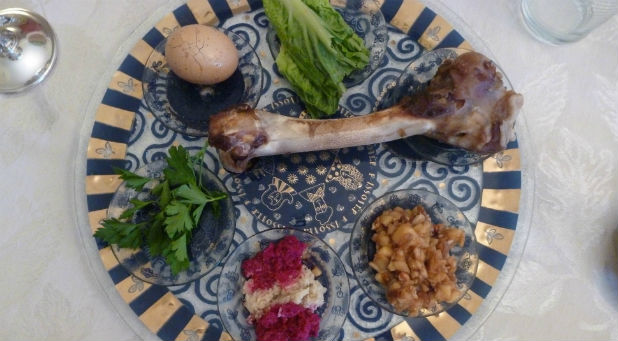It is not surprising that two rabbis have argued that Christians should not participate in the Seder, the traditional Jewish Passover meal, although it is mildly surprising that the rabbis expressed their opinion on the pages of Christianity Today.
The article, “Jesus Didn’t Eat a Seder Meal,” was written by rabbis Yehiel E. Poupko and David Sandmel, both of whom celebrate Jewish-Christian dialogue and both of whom call for mutual respect between the faiths. It is for that reason—respect—that they urge Christians not to engage in their own version of a Passover Seder, especially if it is led by a Messianic Jew (a Jewish believer in Jesus).
First, they argue, the Seder meal as it is celebrated today contains elements that were not known in Jesus’ day. So, whatever Passover meal Jesus ate at the last supper, it was not the same as the traditional Seder, which was developed in the following centuries.
Second, the rabbis feel that it is inappropriate and disrespectful for Christians to have their own Passover Seders, since it is taking something that is sacred to Judaism and turning it into a Christian event. Rather, if Christians really want to find out the meaning of the Seder, they should ask one of their Jewish friends for an invitation to a traditional Seder where they can sit and learn as a guest. Or they can ask the local rabbi if he could instruct them about the meaning of the Seder. But this sacred meal must not be co-opted by Christians.
How should we respond?
I would first ask a question: How many Christians are having their own Passover Seders? How many churches are sponsoring these? My guess is that almost all of these are done in conjunction with Messianic Jews. That, I believe, is the real rub for these rabbis.
You see, it is common at this time of the year for Jewish believers in Jesus to host special church events with titles like, “Messiah in the Passover Seder.” During these events, which can draw many hundreds of people, there will be teaching through the night that points to Jesus-Yeshua, the Lamb of God, as the centerpiece of the Passover. He is the one who paved the way for a deliverance even greater than the exodus from the Egypt. He is the one whose blood redeems us from God’s judgment. He is the Passover Lamb!
So, during the meal, the participants look back to the exodus, they look back to the cross, and they celebrate the Jewish roots of their faith.
“But,” someone protests, “that’s the whole problem. That’s what these rabbis are trying to say. Jesus didn’t celebrate this same meal, and it’s wrong to take these Jewish traditions and make them into a platform for preaching a Christian message.”
Actually, as a Messianic Jew myself, and as one who has engaged in serious, academic dialogue with my Jewish community for the last 45 years, I understand this objection. How would we feel if Muslims celebrated Communion but saw in it a prophecy of Muhammad? How would we feel if they co-opted something sacred to us?
But that is where the comparison breaks down.
Muslims do not believe in the crucifixion of Jesus, whereas we do believe in the Passover celebration, beginning with the exodus from Egypt and culminating in the death and resurrection of the Messiah. And Jesus did celebrate a traditional Jewish meal at the last Supper, even if it did not contain all the elements that it contains today. (Remember that Jesus was called rabbi, not reverend. For more on this, see my book The Real Kosher Jesus.) And Paul could write of the Messiah as the Passover Lamb (see 1 Cor. 5:7).
Not only so, but before they believed in Jesus, many Messianic Jews grew up celebrating the Passover Seder. Once they came to faith, the Seder took on much more meaning. That’s why they celebrate Passover in their congregations, and that’s why they teach on the meaning of the Seder at churches. To them, it’s all about redemption, all about deliverance, all about the faithfulness of God, all about His promises to Israel, all about Jesus the Messiah.
Why shouldn’t they celebrate it, and why shouldn’t they teach other Christians about the beauty and meaning of the Seder from their unique, Messianic Jewish perspective? And why shouldn’t Christians learn more about the Jewish roots of their faith?
After all, the stain of anti-Semitism has polluted Church history for centuries, and the more Christians can appreciate the Jewish roots of their faith, the less potential there is for this ugly plague to raise its head again.
Thankfully, Christianity Today posted a response to the rabbis’ article entitled, “Why Christians Can Celebrate Passover, Too,” written by Mitch Glaser and Darrell Bock, both Jewish believers in Jesus.
They note correctly that, “The question of whether or not Jesus celebrated a Passover Seder as we now know it today is to some degree moot. He observed the Passover in the same way as any other first-century Jew. This event can draw Jews and Christians closer to one another rather than driving an additional wedge between our faith communities.”
Thus, what concerns them “is when Christians do not see any identification with the Jewish people and the Jewish backgrounds of their faith. But more to the point, we simply cannot rob Christians of their heritage in Jesus—especially not the events of the Last Supper, which was clearly some type of Passover celebration.”
And while it is true that Christians remember this Last Supper every time they take Communion, it is only in the context of the Passover meal that they are reminded of the contextual roots of that momentous meal: Jesus died as our Passover Lamb.
Again, I’m sensitive to the concerns of these rabbis, and their tone is not antagonistic. But as Jews around the world gather in their homes to celebrate Passover they have no reason to be disturbed by Christian celebrations of Passover. Rather, I would encourage them to ask the question: Why is this meal so important to many Christians as well? Could it be that they have some insights too? {eoa}
See an error in this article?
To contact us or to submit an article























